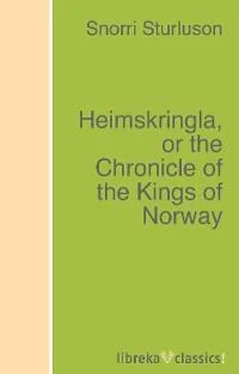Snorri Sturluson - Heimskringla, or the Chronicle of the Kings of Norway
Здесь есть возможность читать онлайн «Snorri Sturluson - Heimskringla, or the Chronicle of the Kings of Norway» — ознакомительный отрывок электронной книги совершенно бесплатно, а после прочтения отрывка купить полную версию. В некоторых случаях можно слушать аудио, скачать через торрент в формате fb2 и присутствует краткое содержание. Жанр: unrecognised, на английском языке. Описание произведения, (предисловие) а так же отзывы посетителей доступны на портале библиотеки ЛибКат.
- Название:Heimskringla, or the Chronicle of the Kings of Norway
- Автор:
- Жанр:
- Год:неизвестен
- ISBN:нет данных
- Рейтинг книги:3 / 5. Голосов: 1
-
Избранное:Добавить в избранное
- Отзывы:
-
Ваша оценка:
- 60
- 1
- 2
- 3
- 4
- 5
Heimskringla, or the Chronicle of the Kings of Norway: краткое содержание, описание и аннотация
Предлагаем к чтению аннотацию, описание, краткое содержание или предисловие (зависит от того, что написал сам автор книги «Heimskringla, or the Chronicle of the Kings of Norway»). Если вы не нашли необходимую информацию о книге — напишите в комментариях, мы постараемся отыскать её.
libreka classics – These are classics of literary history, reissued and made available to a wide audience.
Immerse yourself in well-known and popular titles!
Heimskringla, or the Chronicle of the Kings of Norway — читать онлайн ознакомительный отрывок
Ниже представлен текст книги, разбитый по страницам. Система сохранения места последней прочитанной страницы, позволяет с удобством читать онлайн бесплатно книгу «Heimskringla, or the Chronicle of the Kings of Norway», без необходимости каждый раз заново искать на чём Вы остановились. Поставьте закладку, и сможете в любой момент перейти на страницу, на которой закончили чтение.
Интервал:
Закладка:
32. HAKON'S DEATH.
When King Hakon came out to his ship he had his wound bound up; but the blood ran from it so much and so constantly, that it could not be stopped; and when the day was drawing to an end his strength began to leave him. Then he told his men that he wanted to go northwards to his house at Alreksstader; but when he came north, as far as Hakonarhella Hill, they put in towards the land, for by this time the king was almost lifeless. Then he called his friends around him, and told them what he wished to be done with regard to his kingdom. He had only one child, a daughter, called Thora, and had no son. Now he told them to send a message to Eirik's sons, that they should be kings over the country; but asked them to hold his friends in respect and honour. "And if fate," added he, "should prolong my life, I will, at any rate, leave the country, and go to a Christian land, and do penance for what I have done against God; but should I die in heathen land, give me any burial you think fit." Shortly afterwards Hakon expired, at the little hill on the shore-side at which he was born. So great was the sorrow over Hakon's death, that he was lamented both by friends and enemies; and they said that never again would Norway see such a king. His friends removed his body to Saeheim, in North Hordaland, and made a great mound, in which they laid the king in full armour and in his best clothes, but with no other goods. They spoke over his grave, as heathen people are used to do, and wished him in Valhal. Eyvind Skaldaspiller composed a poem on the death of King Hakon, and on how well he was received in Valhal. The poem is called "Hakonarmal":—
SAGA OF KING HARALD GRAFELD AND OF EARL HAKON SON OF SIGURD.
PRELIMINARY REMARKS
This saga might be called Gunhild's Saga, as she is the chief person in it. The reign of King Harald and Earl Hakon is more fully described in the next saga, that is, Olaf Trygvason's. Other literature on this epoch:
"Agrip" (chap. 8), "Historia Norvegia", (p. 12), "Thjodrek" (chap. 5), "Saxo" (pp. 479-482), "Egla" (chaps. 81, 82), "Floamanna" (chap. 12), "Fareyinga" (chaps. 2, 4, 10), "Halfred's Saga" (chap. 2), "Hord Grimkelsons Saga" (chaps. 13, 18), "Kormak" (chaps. 19-27), "Laxdaela" (chaps. 19-21), "Njala" (chaps, 3-6).
The skalds of this saga are:—Glum Geirason, Kormak Agmundson, Eyvind Skaldaspiller, and Einar Helgason Skalaglam.
1. GOVERNMENT OF THE SONS OF EIRIK.
When King Hakon was killed, the sons of Eirik took the sovereignty of Norway. Harald, who was the oldest of the living brothers, was over them in dignity. Their mother Gunhild, who was called the King-mother, mixed herself much in the affairs of the country. There were many chiefs in the land at that time. There was Trygve Olafson in the Eastland, Gudrod Bjornson in Vestfold, Sigurd earl of Hlader in the Throndhjem land; but Gunhild's sons held the middle of the country the first winter. There went messages and ambassadors between Gunhild's sons and Trygve and Gudrod, and all was settled upon the footing that they should hold from Gunhild's sons the same part of the country which they formerly had held under King Hakon. A man called Glum Geirason, who was King Harald's skald, and was a very brave man, made this song upon King Hakon's death:—
This song was much favoured. When Eyvind Finson heard of it he composed the song which was given before, viz.:—
This song also was much favoured, and was spread widely abroad; and when King Harald came to hear of it, he laid a charge against Evyind affecting his life; but friends made up the quarrel, on the condition that Eyvind should in future be Harald's skald, as he had formerly been King Hakon's. There was also some relationship between them, as Gunhild, Eyvind's mother, was a daughter of Earl Halfdan, and her mother was Ingibjorg, a daughter of Harald Harfager. Thereafter Eyvind made a song about King Harald:—
Gunhild's sons resided mostly in the middle of the country, for they did not think it safe for them to dwell among the people of Throndhjem or of Viken, where King Hakon's best friends lived; and also in both places there were many powerful men. Proposals of agreement then passed between Gunhild's sons and Earl Sigurd, .or they got no scat from the Throndhjem country; and at last an agreement was concluded between the kings and the earl, and confirmed by oath. Earl Sigurd was to get the same power in the Throndhjem land which he had possessed under King Hakon, and on that they considered themselves at peace. All Gunhild's sons had the character of being penurious; and it was said they hid their money in the ground. Eyvind Skaldaspiller made a song about this:—
Now when King Harald heard this song, he sent a message to Eyvind to come to him, and when Eyvind came made a charge against him of being unfaithful. "And it ill becomes thee," said the king, "to be my enemy, as thou hast entered into my service." Eyvind then made these verses:—
But King Harald forced Eyvind to submit himself to his clemency. Eyvind had a great gold ring, which was called Molde, that had been dug up out of the earth long since. This ring the King said he must have as the mulet for the offence; and there was no help for it. Then Eyvind sang:—
Eyvind went home; but it is not told that he ever came near the king again.
2. CHRISTIANITY OF GUNHILD'S SONS.
Gunhild's sons embraced Christianity in England, as told before; but when they came to rule over Norway they made no progress in spreading Christianity—only they pulled down the temples of the idols, and cast away the sacrifices where they had it in their power, and raised great animosity by doing so. The good crops of the country were soon wasted in their days, because there were many kings, and each had his court about him. They had therefore great expenses, and were very greedy. Besides, they only observed those laws of King Hakon which suited themselves. They were, however, all of them remarkably handsome men—stout, strong, and expert in all exercises. So says Glum Geirason, in the verses he composed about Harald, Gunhild's son:—
The brothers sometimes went out on expeditions together, and sometimes each on his own account. They were fierce, but brave and active; and great warriors, and very successful.
3. COUNCILS BY GUNHILD AND HER SONS.
Gunhild the King-mother, and her sons, often met, and talked together upon the government of the country. Once Gunhild asked her sons what they intended to do with their kingdom of Throndhjem. "Ye have the title of king, as your forefathers had before you; but ye have little land or people, and there are many to divide with. In the East, at Viken, there are Trygve and Gudrod; and they have some right, from relationship, to their governments. There is besides Earl Sigurd ruling over the whole Throndhjem country; and no reason can I see why ye let so large a kingdom be ruled by an earl, and not by yourselves. It appears wonderful to me that ye go every summer upon viking cruises against other lands, and allow an earl within the country to take your father's heritage from you. Your grandfather, whose name you bear, King Harald, thought it but a small matter to take an earl's life and land when he subdued all Norway, and held it under him to old age."
Harald replied, "It is not so easy, mother, to cut off Earl Sigurd as to slay a kid or a calf. Earl Sigurd is of high birth, powerful in relations, popular, and prudent; and I think if the Throndhjem people knew for certain there was enmity between us, they would all take his side, and we could expect only evil from them. I don't think it would be safe for any of us brothers to fall into the hands of the Throndhjem people."
Then said Gunhild, "We shall go to work another way, and not put ourselves forward. Harald and Erling shall come in harvest to North More, and there I shall meet you, and we shall consult together what is to be done." This was done.
Читать дальшеИнтервал:
Закладка:
Похожие книги на «Heimskringla, or the Chronicle of the Kings of Norway»
Представляем Вашему вниманию похожие книги на «Heimskringla, or the Chronicle of the Kings of Norway» списком для выбора. Мы отобрали схожую по названию и смыслу литературу в надежде предоставить читателям больше вариантов отыскать новые, интересные, ещё непрочитанные произведения.
Обсуждение, отзывы о книге «Heimskringla, or the Chronicle of the Kings of Norway» и просто собственные мнения читателей. Оставьте ваши комментарии, напишите, что Вы думаете о произведении, его смысле или главных героях. Укажите что конкретно понравилось, а что нет, и почему Вы так считаете.












